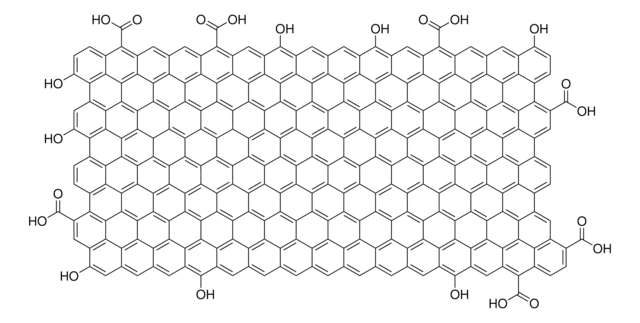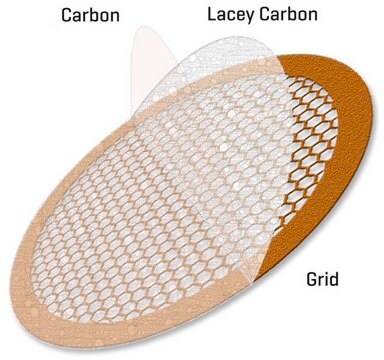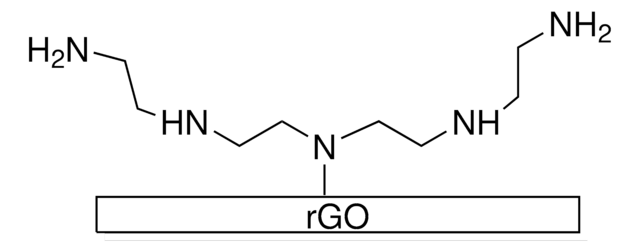918032
Graphene oxide for bioconjugation
6-arm PEG amine functionalized
Synonym(s):
Bioconjugatable graphene oxide
Sign Into View Organizational & Contract Pricing
All Photos(1)
About This Item
UNSPSC Code:
12352119
NACRES:
NA.23
Recommended Products
Quality Level
form
dispersion in H2O
mol wt
PEG Mw 15,000 (6-arm PEG amine)
concentration
2.0 mg/mL
color
dark brown
pH
3-4
General description
Graphene oxide is a hydrophilic two-dimensional (2D) material that is dispersible in water. This graphene oxide product contains covalently bound 6-arm PEG (15K) amine linkers that can be used for bioconjugation with carboxylic acid containing biomolecules. The 6-arm PEG amine functionality increases the number of binding sites for bioconjugation versus graphene oxide, and the amine groups offer popular and established coupling chemistry.
Application
Our bioconjugatable graphene oxide brings the advantages of two-dimensional materials to biotechnology. The fluorescence quenching property of graphene oxide has been used in many biosensor applications. Amine functionalization makes our graphene oxide easy to couple your protein, antibody, or other carboxylic acid containing target for use in biosensor applications based on fluorescence quenching. Additionally, graphene oxide has been used extensively in tissue engineering applications. PEG modification may even increase the biocompatibility of graphene oxide in vivo. Lastly, graphene oxide has been used in targeted drug delivery and in photothermal cancer therapy, and our bioconjugatable graphene oxide makes it easier to add your targeting ligands.
Storage Class Code
12 - Non Combustible Liquids
WGK
WGK 2
Flash Point(F)
Not applicable
Flash Point(C)
Not applicable
Choose from one of the most recent versions:
Certificates of Analysis (COA)
Lot/Batch Number
Don't see the Right Version?
If you require a particular version, you can look up a specific certificate by the Lot or Batch number.
Already Own This Product?
Find documentation for the products that you have recently purchased in the Document Library.
Biosensors based on graphene oxide and its biomedical application.
Lee J, et al.
Advanced Drug Delivery Reviews, 105, 275-275 (2016)
Graphene-based nanomaterials and their potentials in advanced drug delivery and cancer therapy.
Liu J, et al.
Journal of Controlled Release : Official Journal of the Controlled Release Society, 286, 64-73 (2018)
Ana M Díez-Pascual et al.
ACS applied materials & interfaces, 8(28), 17902-17914 (2016-07-08)
Poly(propylene fumarate) (PPF)-based nanocomposites incorporating different amounts of polyethylene glycol-functionalized graphene oxide (PEG-GO) have been prepared via sonication and thermal curing, and their surface morphology, structure, thermal stability, hydrophilicity, water absorption, biodegradation, cytotoxicity, mechanical, viscoelastic and antibacterial properties have been
Functionalized graphene oxide triggers cell cycle checkpoint control through both the ATM and the ATR signaling pathways.
Wang Y, et al.
Carbon, 129, 495-503 (2018)
Graphene Oxide as an Optical Biosensing Platform.
Narvaez M, et al.
Advanced Mat., 24, 3298-3298 (2012)
Our team of scientists has experience in all areas of research including Life Science, Material Science, Chemical Synthesis, Chromatography, Analytical and many others.
Contact Technical Service







